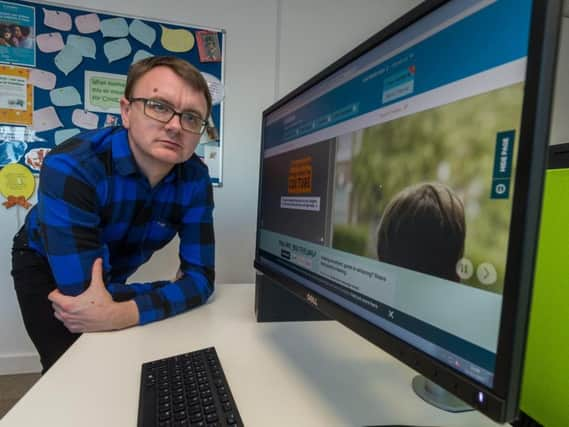Leeds Childline supervisor reveals scale of young people's mental health calls to service


When Darren Worth joined the Childline team in 2007, it was uncommon for even a couple of young people to get in touch over suicidal feelings during a shift. Today, that picture is very different. In 2017/18, the NSPCC provided service delivered 24,549 counselling sessions nationwide where suicidal thoughts and feelings were the main concern - up more than 2,000 on the previous year.
“When I first started, if I was on shift and two people spoke about suicidal feelings in the whole night, that felt like a busy, stressful and risky shift,” explains Darren, a senior supervisor at Childline Leeds. “Now it’s very common for lots and lots of people to talk about suicidal thoughts and the complexity of what young people present with seems much higher.”
Advertisement
Hide AdAdvertisement
Hide AdDarren discussed the scale of Childline contacts relating to children’s mental health at a conference in Leeds last month. The event, organised by education consultancy Webanywhere and aimed at teachers, focused on why children’s mental health is more important than academic achievement, in the run up to exam period.
“The biggest thing children and young people tell us about exam stress is the sense that their exams are the be all and end all, that their life will be over if they fail and the fear of letting their parents, their teachers and themselves down is very strong. We hear that from young people who aren’t expected to get great exam results and we also hear it from those young people who have been identified as gifted and talented - and everything in between.”
Whilst some young people present with worries about school, exams and the future, others may talk about emotional and physical changes they are experiencing, relationships with family and friends, physical or sexual abuse, and their wellbeing.
In 2017/18, nearly two in five of the counselling sessions the Childline service provided were about mental and emotional health, including feeling depressed, suicidal thoughts and self harm. The number of sessions mentioning anxiety rose from 13,746 the previous year to more than 21,000.
Advertisement
Hide AdAdvertisement
Hide Ad“This points really clearly to how important mental health is for children and young people and how much of a challenge it is for so many of them,” Darren says.
“Being available in between therapy sessions and at night when mental health symptoms can often seem to get worse was invaluable for some of the young people who contacted us,” he adds, referring to the availability of the service anytime day and night.
Childline offers confidentiality to those who make contact - though in some cases, such as a life being in danger, it has to break this to keep people safe.
"In the first 18 months I worked at Childline, I breached a young person’s confidentiality on one occasion to do with suicidal feelings,” Darren recalls. “And since the start of April, the Leeds base has already done about 23 breaches of confidentiality for suicidal feelings.”
Advertisement
Hide AdAdvertisement
Hide AdChildline’s latest annual report The Courage To Talk says it is clear from what children and young people are saying that they don’t feel they have access to the help and support they need at the time they need it or in the way they need it.
The NSPCC’s Are You There? campaign is calling on the Government to increase funding to Childline to ensure that it is able to support more of the young people seeking help with their mental health concerns outside school hours.
“We all know that there’s no magic solutions to supporting young people who are struggling with their mental health,” Darren says. “But we do know that a listening ear can be really helpful, that treating young people with empathy and compassion and be really effective and that it is important to create an environment were young people can begin to open up.”